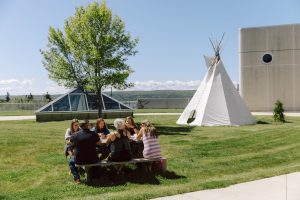Health & Safety
Student health and safety is a priority. Safety is a shared responsibility amongst NSCC, the Service Learning partner, and the student. Insurance and risk management practices are of the utmost importance in ensuring the health and safety of our students.
To demonstrate NSCC’s due diligence, it is important that a risk assessment is completed, required forms are reviewed and signed, and safety plans are in place. NSCC maintains several insurance policies to protect employees, students, and the community organization. These include errors and omissions, general liability, and student accident insurance should any accidents or incidents occur.

Student Insurance
The following is language from NSCC’s Work-Integrated Learning Guides regarding student insurance. The coverage outlined below will extend to service learning experiences. If you have any questions regarding insurance, please email workexperience@nscc.ca .
Most students are automatically enrolled in or covered by existing NSCC insurance plans while engaged in work experience activities. The Student Insurance Program (SIP) Accident insurance protects students in the event of a workplace accident for some expenses not covered by NS Medical Services Insurance Program (MSI). If the student is from another province in Canada, they have basic coverage provided by the equivalent Medical Services Insurance program from their home province. The same is applicable for students from Nova Scotia who intend to complete their placements in another province. Students should only apply to change their provincial health care if they live in the new province for 183 days of the calendar year.
If a student is a paid employee, they are covered by the industry partner’s WCB account while on placement. They are also covered by existing NSCC Insurance plans while engaged in work-integrated learning activities.
NSCC’s General Liability insurance protects students and the College in the event that a student causes bodily injury or property damage to a third party while on work experience. Students in Health & Human Services programs are also covered also medical malpractice coverage.
Employer/Community Partner Insurance
In most cases, NSCC requires that service learning partners carry a general liability insurance policy of at least $2 million. This not only protects our students, but also demonstrates that industry/community partners promote safe workplace and risk management practices.
Some community partners may not carry the minimum general liability insurance to guard against risk within their organizations. In these cases, NSCC may allow service learning with these industry partners if the following process is completed.
Student and supervising faculty, in conjunction with the industry partner, complete the Service Learning Agreement. The assessment is reviewed by the Academic Chair, who assesses the level of risk. If comfortable with the level of risk, the Academic Chair consults with OHSE to confirm his/her assessment of the risk. If all parties are comfortable with the level of risk, the Academic Chair and supervising faculty sign-off with their approvals.
Exceptions are NOT possible if the service learning takes place in an industrial, construction, healthcare, or aviation setting, or any other setting that would be considered as potentially hazardous or high risk.
For more information, please see the Work-Integrated Learning Insurance Guidelines on College’s website.
Risk Management
A vital component of service learning is ensuring that our students are placed in safe environments with proper risk management practices in place.
Faculty are responsible for approving service learning projects and reviewing risk management practices with the community partner. The community partner must be able to describe any safety programs, safe work procedures, and protective measures that are in place to support student health and safety. Career and Employment Services have created several forms and checklists to help guide these conversations to assist students, faculty, and partners identify the types of risks to consider and acknowledge.
Prior to the start of service learning, faculty and students are responsible for completing the Service Learning Agreement (located on Connect) jointly with the community partner. This agreement will help to identify any job hazards and control measures, determine any personal protective equipment that is required, and ensure the community partner has the appropriate liability insurance. The original copy of this completed form must be kept with the Academic Chair.
Accident/Incident Reporting Process
Prior to a student starting their service learning, it is important to ensure that they know what to do and who to contact if they find themselves in an unsafe or disrespectful working environment.
In case of a serious accident or incident requiring ambulance transport, hospitalization, or emergency care, contact the office of NSCC Occupational Health, Safety & Environmental Services IMMEDIATELY at 902-491-7233.
If the accident/incident is not serious in nature:
The student must complete the Accident/Incident Report (also found on Connect) and notify their faculty/academic chair.
Completed accident/incident forms must be submitted to Career and Employment Services by email (WorkExperience@nscc.ca). Career and Employment Services will forward the completed form to the Faculty, Academic Chair, Principal and Occupational Health, Safety & Environmental Services. Upon receipt of the completed Accident/Incident Report, if Faculty/AC and students have yet to connect, faculty will make every effort to contact the injured student. Career and Employment Services will also add a note to the community partner’s profile in the Work Experience Portal for faculty to consider when approving work experiences. The Faculty or Academic Chair must submit the online Incident Reporting Form located on Connect.
Safe & Respectful Environment
NSCC is committed to ensuring that all students and employees learn and work in a safe environment, free from discrimination and harassment, and conducive to learning and teaching. NSCC is also committed to ensuring fair and equitable treatment of all members of its community, while maintaining the academic integrity of programs and curriculum, and an academic climate conducive to learning, free from disruptive or inappropriate behaviour.
To learn more about NSCC’s commitment to providing safe and respectful work environments, visit NSCC Policies and Procedures


